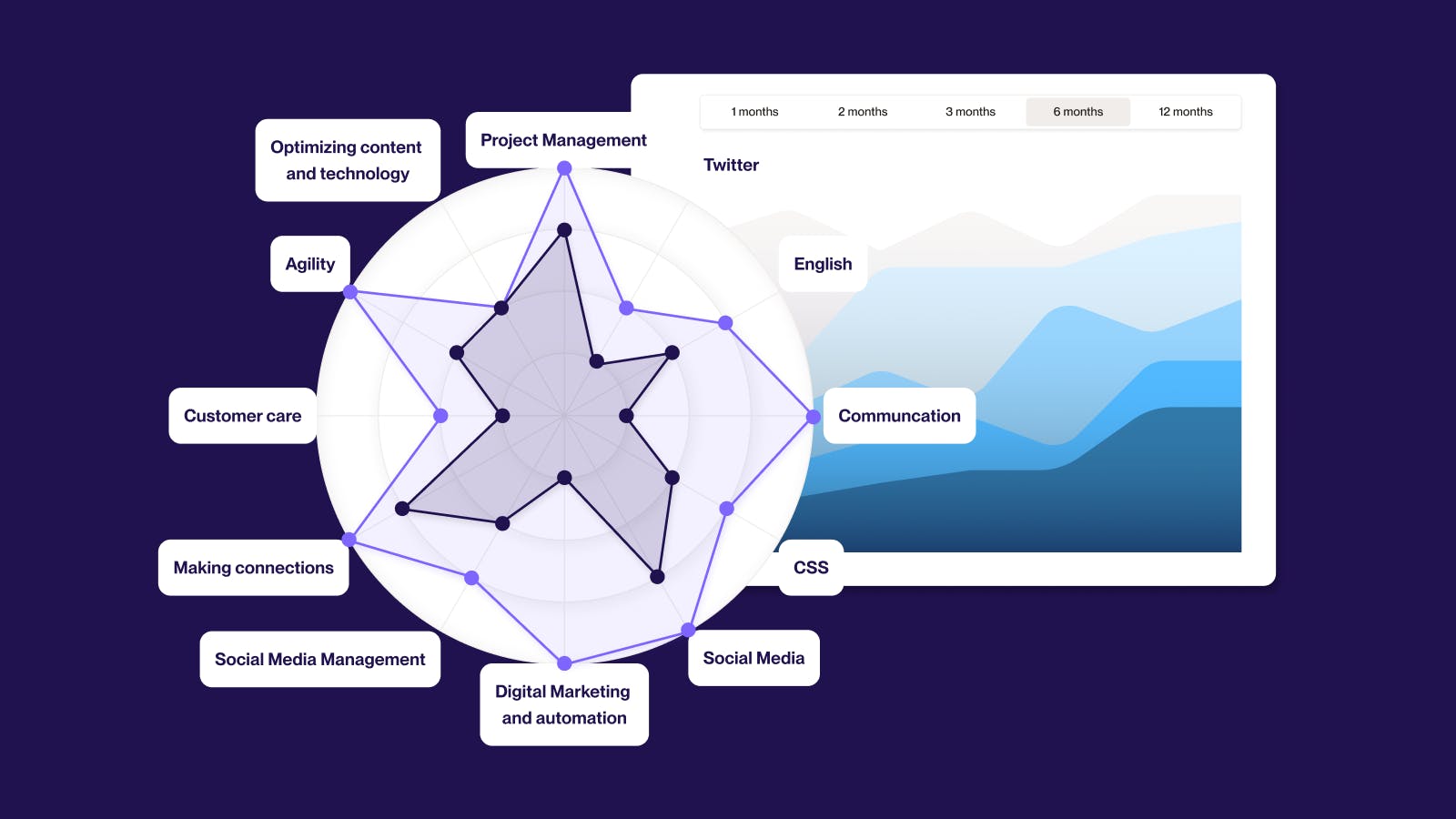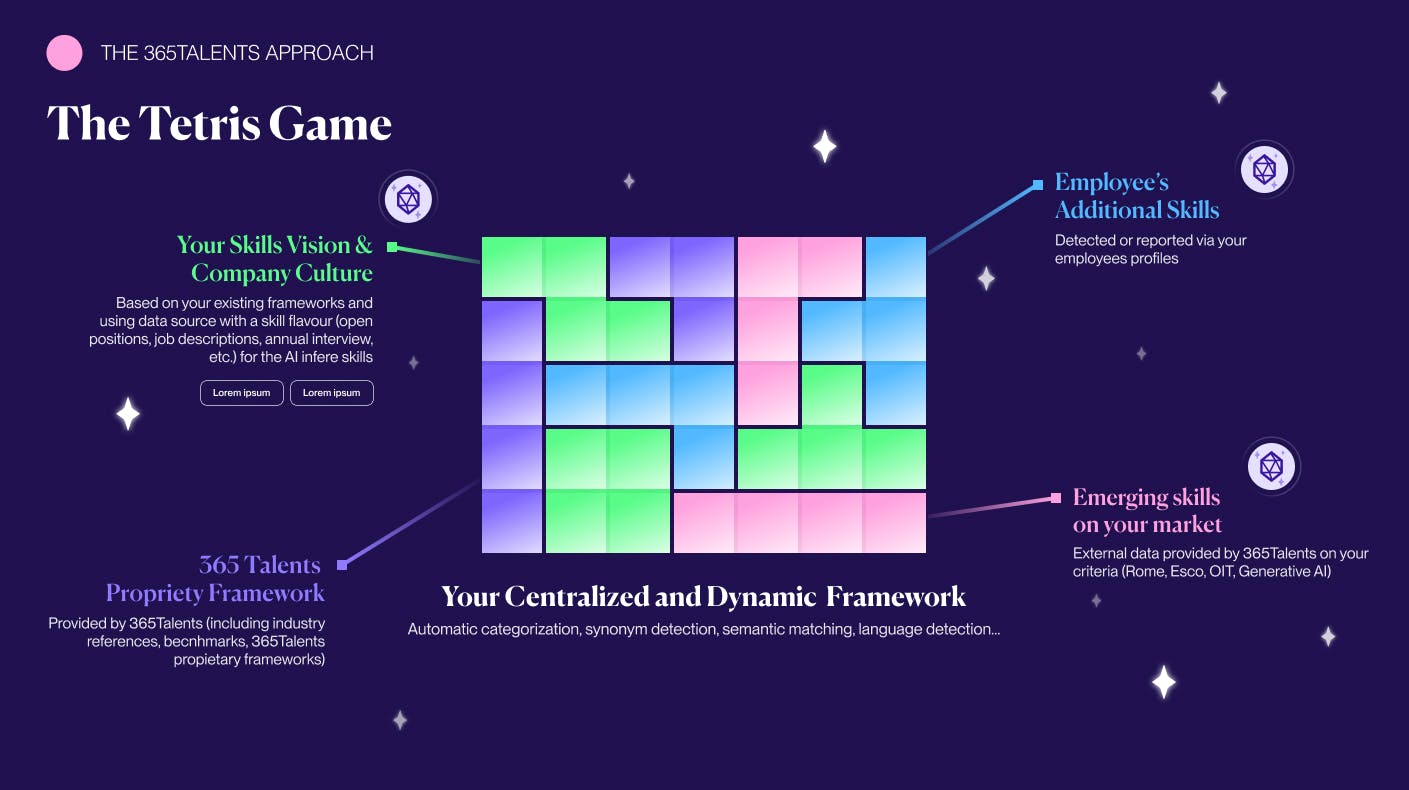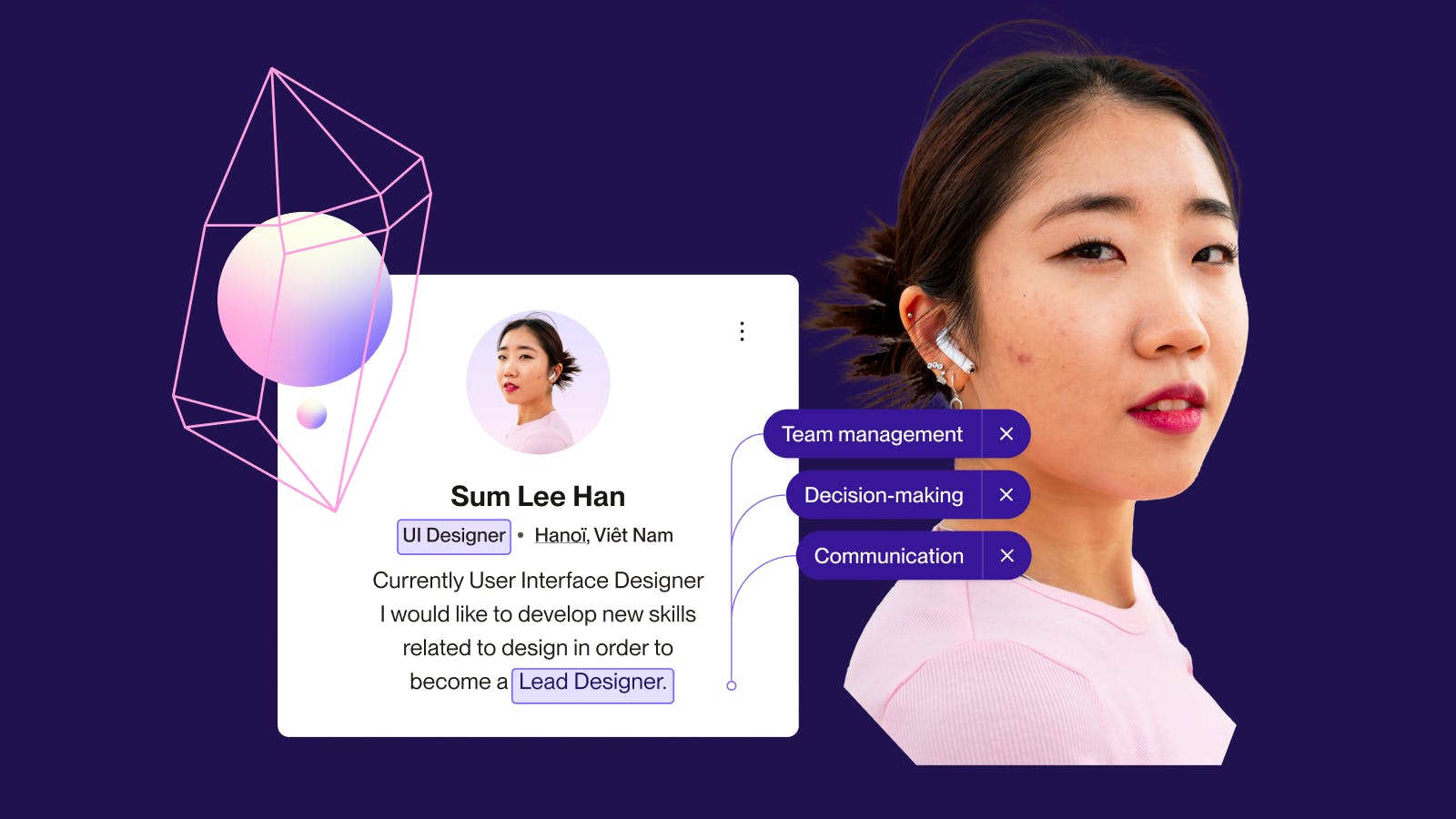How to overcome the skills shortage with skills management

The Great Resignation, the war for talent, digital transformation... there has been no shortage of changes in the world of work in recent years. HR professionals are tasked with tackling these challenges every day and must reinvent themselves in order to meet the needs of this ever-changing workforce.
Today, our leaders are facing a new challenge: the skills shortage.
According to a French LinkedIn study, 50% of training specialists say executives are concerned about the mismatch between staff skills and those needed to execute corporate strategy. This represents a 16-point increase on the previous year.
In addition to leaving companies' productivity and competitiveness in tatters, a skills shortage on the job market also has consequences for talent and HR. The former don't have all the skills they need to carry out their roles successfully, while the latter need to recruit, internally or externally, the talent with the missing skills to fill the gap.
So, how do you find and develop candidates with the right skills?
Let's take a look at the causes of the skills shortage, its consequences and impact, and best strategies for bridging the gap.
Understanding the skills shortage
The skills shortage refers to the mismatch between the skills sought by employers and those offered by candidates. It affects all sectors and all levels of qualification.
(You may also hear this called a skills gap, although it's important to note that skills gap can also refer to other discrepancies between skill supply and demand, not necessarily in a recruitment context.)
In April 2022, the French public employment service Pôle Emploi published its "Need for Manpower" survey sent to companies to find out their recruitment needs and challenges. The results revealed that 58% of recruitments are deemed "difficult" by the 424,000 questioned. Worse still, the study mentions "unprecedented recruitment difficulties.”
In their recruitment processes, more and more companies are choosing to focus as much, if not more, on the "skills" of applicants, rather than their qualifications. This is a good thing, of course, but we can see that they are having difficulty recruiting because of the discrepancies between the skills deemed essential for a position, and those possessed by talented candidates.
In a fast-changing job market, how can we explain this recruitment challenge?
Origins and causes of the skills shortage
Technological and digital transformation
The growth and diversification of digital technologies and tools explains why some candidates and employees lack skills: not everyone is trained in new technologies, including digital means of communication, and digital or IT tools. While this may not seem too serious at first glance, a lack of training has consequences not only for skills, but also for everyone's productivity.
What's more, over half the employers (55%) in the Pôle Emploi study said they had received unsuitable applications due to a lack of technical skills.
Obsolete training programs
Although there are many training tools on the market, not all corporate HR departments have yet found the right solution for their needs, or simply haven't looked yet, due to lack of time, budget, or management support. As a result, they rely on their old training processes, which are not always up to date and are, with all the transformations, now obsolete.
The digital revolution has transformed employee training needs as much as corporate skill requirements. However, without the right strategy and the right tools, it's almost impossible for HR to respond to these constantly changing needs, and to provide learning tailored to these new skills.
Candidate motivation
It's not just the needs of companies and the job market that are changing: the needs of candidates and employees are evolving too. Well-being at work, flexibility and corporate culture are new sources of motivation for candidates, and the LinkedIn study, citing 900 million profiles, confirmed that these factors have increased remarkably in recent years.
Employee priorities have changed, and fulfillment at work is a motivation that HR professionals must not overlook. We've mentioned it before, but offering training and skills development plans is key to ensuring that they thrive at work. If your training programs are outdated, or you don't have the development tools to deal with the skills gap, it will be that much harder to recruit and retain employees.
The impact of the skills shortage

HR managers are experiencing the effects of the skills shortage in a few profound ways.
Difficult recruitment
HR managers are increasingly concerned about recruiting. According to a 2023 survey from McKinsey, 77% of HR teams say they struggle to fill open positions due to a skills shortage.
HR is having difficulty attracting talent and recruiting profiles suited to their needs. This situation is explained in particular by the fact that the talents, although possessing the required qualifications, do not possess the practical skills required for the jobs in question.
Poor talent retention
The recruitment phase is not the only one to suffer from hiring shortages. Potential candidates pay the price, of course, but so do your employees. Once on the job, talent retention is always compromised when employees' skills seem incompatible with changes in the sector.
Skills gap
Then comes the skills gap, which can lead to increased difficulty adjusting to job changes, increased workplace stress, and increased resignation rates. This inability to retain talent has seriously affected company culture and caused recruiting costs to skyrocket.
How to deal with the skills shortage? A 3-step guide to skills management

While it is undoubtedly in the interest of HR managers to understand the ins and outs of the skills shortage, but just as importantly, to identify the levers of action to remedy it.
1. Update your recruitment strategy
To attract qualified talent, HR managers must first ensure that their recruitment strategy is adapted, updated according to market trends and needs, as well as the priorities and motivations of candidates.
HR teams can start by:
Working on brand image:: To attract qualified talent, HR should take into account the needs and motivations of candidates. You know that corporate culture, well-being at work and flexibility are essential in their eyes. You can therefore try to review your internal HR policies, make your corporate culture even more positive and highlight it in order to adapt your job offers. Offering opportunities for professional development is another strategy that will help you stand out.
Diversify your selection criteria: Looking only at diplomas is no longer enough. Many companies now rely on skills instead, why not do the same? This will help you avoid limiting the number of applications initially. If candidates have the skills you need, you'll more easily close the skills gap. Better yet, you will be able to plan for a development plan.
Use innovative recruitment tools: You may already know that there are new HR tools to help with recruitment. Platforms like LinkedIn, Glassdoor or Indeed contain profiles to contact directly to anticipate the needs of the company, and often for free. However, to optimize time and efficiency, you can also use solutions that leverage artificial intelligence to sort through applications for you.
Opt for data-driven internal recruitment: Data analysis has transformed recruitment methods. Today, there are so-called “data-driven” solutions, which analyze your data to help you find qualified internal candidates as quickly as possible. Solutions like 365Talents are based on skills data in order to analyze the skills present within the company, those necessary for the success of a position and trends in terms of market developments.
Companies don't necessarily think about it, but your best talents are often right before your eyes, and their untapped skills may create the best candidate!
2. Foster a culture of learning & development
In the era of technological progress, companies can no longer afford to ignore the training and upskilling of their teams. Whether your employee is taking up a new role, pursuing an internal mobility or simplying looking to increase their skills, investing in the development of your people through training is essential.
Existing employees can learn new skills through additional internal training and certifications. Take, for example, the challenge of digital transformations among certain generations – offering training on new technologies and communication tools can be a great way to ensure your people are prepared for present and future work environments.
In-house training also allows you to monitor professional development and encourage your employees to remain competitive in an increasingly demanding job market. Certifications are therefore one of the solutions to respond to the shortage of qualified workers while strengthening the employer brand.
A culture of continuous learning therefore makes it possible to promote the recruitment of candidates and increase engagement of existing employees through the improvement of skills.
3. Optimize skills management
Jobs evolve too quickly, but focusing on skills will allow you to anticipate the needs of the jobs of the future, no matter what those jobs themselves look like. If you are still hesitant to move to a skills-based approach, you can still start by implementing and improving your skills management.
Skills management is a process aimed at identifying, evaluating, developing and aligning employee skills with the company's objectives. It is about having the right skills in the right place at the right time to ensure the success of your team and your organization.
Having an effective skills management strategy allows you to know all the skills of your employees in order to:
- Optimize recruitment
- Staff projects precisely
- Define training needs in order to offer appropriate training to the right candidates
- Evaluate the level of expertise of your teams in order to stay up to date with the expected level of the market and not fall behind the competition
- Propose adapted remuneration and compensation policy
- Monitor and track development of critical skills
As a result, skills management provides a complete visualization of the skills already acquired within your organization, those missing and those needed for open positions.
This visibility, in turn, allows you to know whether external recruitment is really necessary or not, or whether, like many companies, you can rely on the skills of your existing employees.








Why leverage the skills of your employees
Employees and their skills are the greatest strength of any company.
To deal with the skills shortage, your best weapon will be your skills management.
Thanks to it, you will be able to see your skill supply and needs, and offer skills development to all your employees to take advantage of their untapped potential. Why invest in increasingly high recruitment costs if the best talent is right in front of you?
But what and where to start? The right skills management tool can help you:
- Establish a map of your company’s current skills
- Identify the skills you need
- Qualify skills gaps in order to propose skills development plans
- Prioritize internal recruitment, to encourage skills development and personalized career growth
Using your skills data, you can obtain an up-to-date skills map for your company, and compare it with those of the market and your sector to deduce the gaps. This allows you to propose an action plan to develop the skills they do not possess and help them better respond to and align with your business needs.
By focusing on current and in-demand skills, you can not only increase the productivity and performance of your teams, but also create a culture that attracts and retains talent.
The digitalization of these processes via innovative solutions can allow you to facilitate and optimize your approach. Skills management software meets the challenges of centralizing essential data for the service of skills development. It makes it possible to automate processes, optimize and update data and increase employee support for data sharing.
In sum, skills management offers:
- Considerable time savings in identifying the skills of your talents
- Quickly listed and dynamic skills repositories
- Updated and dynamic mapping of professions and jobs
- Better alignment between the business needs of the company and the skills needs of employees
- Skills gap identification in no time, along with market and industry analysis
- Better assessment of internal changes and future changes
Powered by AI, 365Talents carries out skills mapping, updated in real time and thus provides a dynamic skills repository. Our semantic analysis technology makes it possible to capture all the talents of your employees. 365Talents identifies and synthesizes the same skills even if they have a different name or language.
Then, our platform suggests assignments, mobilities and trainings based on the desires of your employees and the needs of the company. This makes it easy to narrow skills gaps, improve development and upskilling, in just a few clicks.
By allowing you to optimize your skills management, 365Talents helps you:
- Future-proof your strategy with intelligent suggestions and analytics to prepare your employees for the future
- Engage and retain talent thanks to a talent experience that empowers your employees in their development
- Improve internal mobility by recruiting more quickly for projects, assignments and open positions thanks to intelligent suggestions and better visibility on your internal candidates
- Make your employees active participants in their professional career, by anticipating their development and suggesting relevant resources to them
Gain insights into skills and trends to close skills gaps and plan for the future








How we build your skills ontology and framework: The Tetris game
365Talents helps you to create a unique, accurate, and concise skills framework that aligns with your organization's specific skills context and culture. The framework is designed to be accurate, tailored to the specific abilities of your employees, and constantly updated to meet HR use cases and stay in sync with the latest trends. It is also designed to be dynamic, operating seamlessly within the flow of work, making it an invaluable tool for HR professionals. Most importantly, skills data should be accessible to all other HR processes and systems, serving as a common language for Talent Management and Talent Experience.
To achieve these objectives effectively, we use both top-down and bottom-up approaches to help you build a specific skills framework. Imagine your skills framework like a Tetris game board.
Your framework is a fusion of various sources that, through smart and strategic interpretation and manipulation, can be fit together for a seamless, rock-solid view of your company’s current skills.
No matter the shape, size or quantity of the skills data you currently have, we can integrate additional data or complement it with our existing frameworks, filling in any gaps you might have and mirroring your historical approach.
Once everything is live, you have your centralized and dynamic skills framework. Our technology takes over, performing automatic categorization, synonym detection, semantic matching, language detection, and automatic translation.

With proper skills management, the skills and careers of your employees will no longer be a secret to you. The right skills management software can automate processes, optimize and update data and increase employee engagement in data sharing while saving you time and energy.
To learn more about how skills management can help you tackle the skills shortage, get in touch with the 365Talents teamget in touch with the 365Talents team.


Discover 365Talents' Skills Management Guide
Read on and discover the power of skills management and how 365Talents can empower your organization to reach success.

Learn more about skills management









